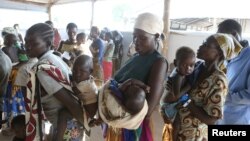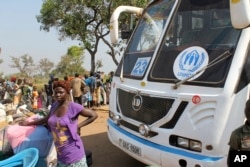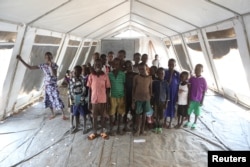More than three years of civil war in South Sudan has forced 1.5 million people to flee into neighboring countries, creating Africa's largest refugee crisis and the third largest in the world after Syria and Afghanistan, the U.N. refugee agency reports.
Since fighting erupted between the government of President Salva Kiir and rebel forces led by First Vice-President Riek Machar in December 2013, the United Nations estimates more than 3.5 million people have become homeless.
More than 2 million people have been displaced within the country, and the rest — or more than 1.5 million — have taken refuge in six neighboring countries — Uganda, Ethiopia, Sudan, Kenya, Democratic Republic of the Congo, and Central African Republic.
Violence prompts people to flee
Intense fighting last July in the capital, Juba, prompted a huge uptick in the number of people fleeing South Sudan in 2016.
UNHCR spokesman William Spindler said more than 760,000 people fled across borders after the collapse of a peace deal between the government and opposition forces.
An average of 63,000 people were forced to leave the country every month. Some half-a-million had to flee in the last four months since September 2016.
"More than 60 percent of the refugees are children, many arriving with alarming levels of malnutrition — enduring devastating impact of the brutalities of the ongoing conflict," he said.
Impact on nearby countries huge
Newly arriving refugees have reported widespread suffering inside South Sudan, including massacres, kidnappings, and rape.
The UNHCR said the refugees told aid workers that “fears of armed groups and threats to life, as well as acute food shortage,” forced them to leave their homes and seek asylum.
Spindler told VOA the impact of hundreds of thousands of refugees on neighboring countries has been huge.
“There are refugees in camps,” he said, “but there are many who are hosted by the local communities, which are some of the poorest in those countries. That is why it is so important that those countries and those communities continue to receive assistance.”
Appeal for funds comes up short
Spindler explained that with so many “large-scale displacements” around the world, UNHCR humanitarian operations are suffering from a lack of attention and chronic underfunding.
He said it was particularly worrisome in the case of South Sudan, given the large size of its refugee crisis. He praised the generosity of the host countries, but noted that his agency's relief efforts were being hampered by a serious lack of money.
Last year's appeal for $649 million, he noted, was funded to only 33 percent, making it extremely difficult to provide critical services, such as clean drinking water, food, health and sanitation facilities.
He said the UNHCR currently was working with authorities in the host countries to provide life-saving support and basic needs for the many South Sudanese arriving in desperate condition.
Uganda's handling of refugees impressive
Uganda is hosting most of the South Sudanese refugees, nearly 700,000. Despite this huge burden, Spindler told VOA that the treatment of the refugees by the Ugandan authorities was exemplary in many ways.
“They are integrated into the community. They are allowed to have access to farming land. So, they are not all in camps,” said Spindler.
“So, the UNHCR approach is to help not just the refugees, but the communities hosting them, which are themselves, in some cases, very poor and in great need,” he said.
No end to crisis in sight
Spindler noted that no solution to this conflict, which was entering its fourth year, was in sight. As the numbers of refugees grew, so did the needs.
He said it was imperative that the international community responded to his agency's appeal for $782 million so that it could carry out its regional humanitarian operations.
He said millions of people displaced inside Sudan, as well as the refugees and the host communities sheltering them in neighboring countries depended upon a good response to the appeal for their survival.






